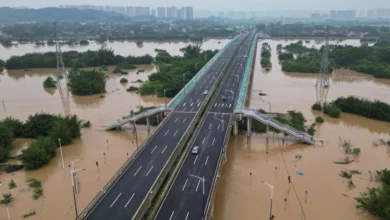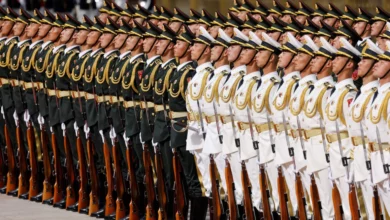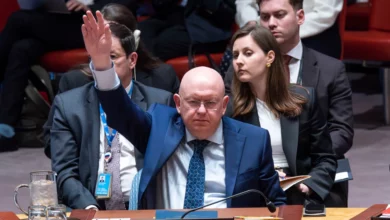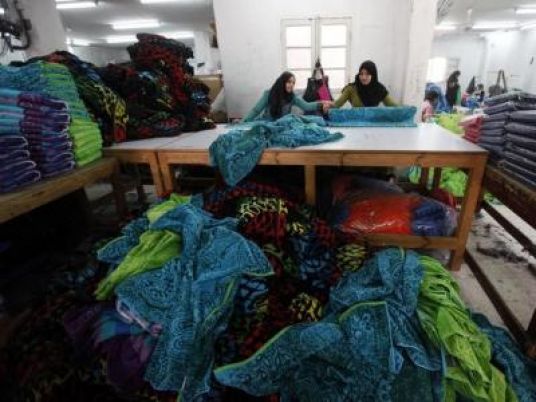At least 23 people were reported killed in Syria Saturday as violence intensified in the eighth month of an uprising against President Bashar al-Assad, pushing the death toll close to 4,600, an activist group said.
The Arab League, which has deepened Assad's isolation by announcing economic sanctions against Damascus, gave Syria until Sunday to sign an initiative to end the crackdown, Qatar's foreign minister said.
He did not explicitly say when the sanctions would come into force, but said they would be imposed soon if Syria does not sign the deal, which includes Arab monitors to ensure that Damascus abides by a promise to end violence.
In a three-hour, night-time battle in the north-western city of Idlib near the Turkish border, seven members of the security forces, five army rebels and three civilians were killed, the Syrian Observatory for Human Rights (SOHR) said.
Five civilians were shot dead by security forces in central Homs province, and a man's body was returned to his family five days after he had been arrested.
The United Nations' top human rights forum has condemned Syria for "gross and systematic" violations by its forces, including executions and the imprisonment of some 14,000 people.
Syrian authorities say they are fighting foreign-backed "terrorist groups" trying to spark civil war who have killed some 1,100 soldiers and police since March.
An "Arab Spring" of revolts has reshaped the political landscape of the Middle East this year and toppled leaders in Tunisia, Egypt and Libya.
Syrian opposition groups say defectors from Syria's conscript army are increasing attacks on government forces trying to suppress the revolt.
Syria faces deepening international and regional isolation, with the Arab League, the European Union and the United States piling on tougher and tougher sanctions.
Qatar's Foreign Minister Sheikh Hamad bin Jassim al-Thani, who has played a lead role in organising Arab League sanctions, said the League gave Damascus one day to sign its initiative.
"If they want to come (and sign) tomorrow they can," he said after a meeting in Doha of an Arab foreign ministers committee tasked with following up the crisis.
He later told Al Jazeera television: "If the signing does not happen tomorrow, and I doubt it will, … if the signing does not happen soon, then the Arab sanctions that have been approved will be in effect."
The Arab League's sanctions committee confirmed that it would freeze the assets of 19 top Syrian officials and Assad associates, and ban them from entering other Arab countries. The number of flights to Syria would be halved.
China and Russia oppose sanctions and last month scuppered Western efforts to pass a U.N. Security Council resolution condemning Assad's government.
Security forces in action
The state news agency SANA gave a detailed account of operations by Syrian security forces, including clashes with "terrorists," arrests and detonating and defusing bombs.
It said special forces caught dozens of wanted men in the area of Tel Kalakh who had been smuggling weapons, drugs and armed men from Lebanon into Syria. Special forces also captured 14 gunmen who, SANA said, had been killing and kidnapping civilians and soldiers.
According to the British-based SOHR activist group, nearly a quarter of those killed in the uprising are from the Syrian security forces.
Special forces killed one gunman in a clash in a rural part of Deraa province, and another in a clash in Idlib, SANA said.
SANA said engineers disabled two bombs in Hama but two others exploded, one when a security patrol was passing near a sports stadium, injuring two. In Latakia, a bomb in front of an electrical workshop started a fire in which two people died.
No strategic Iran ties post-Assad
The head of the opposition Syrian National Council (SNC), said the isolation of Syria was accelerating and he was pushing for more international intervention against Damascus and seeking Russian support.
Burhan Ghalioun told the Wall Street Journal he envisioned a post-Assad Syria distanced from anti-Western Iran, and would move closer to the Arab League and Gulf Arab states – countries that are Sunni-led and wary of Shi'ite Iran.
Syria has fostered close ties with Tehran since Iran's 1979 Islamic Revolution. The United States accuses Damascus of helping Iran funnel weapons to Lebanon's Hezbollah fighters.
"There will be no special relationship with Iran. This is the core issue – the military alliance," Ghalioun told the U.S. paper, though he said he did not oppose economic ties.
Ghalioun said the opposition was still trying to persuade Moscow that steps such creating a buffer zone, a humanitarian corridor or a no-fly zone to protect civilians would not lead inevitably to armed intervention.
"This is different than the organised military intervention that happened in Iraq for regime change," he said. "We count on Syrians to bring down the Syrian regime."
Western powers have shown little appetite for armed intervention in Syria because of the complexity of its sectarian divisions and its links to unstable neighbors.




